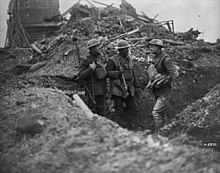Christopher O'Kelly
Christopher Patrick John O'Kelly | |
|---|---|
 | |
| Born | 18 November 1895 Winnipeg, Manitoba, Canada |
| Died | 15 November 1922 (aged 26) Lac Seul, Ontario, Canada |
| Allegiance | |
| Service | Canadian Expeditionary Force |
| Years of service | 1915 - 1922 |
| Rank | Major |
| Unit | 52nd Battalion (New Ontario), CEF |
| Battles / wars | World War I |
| Awards | |
Christopher Patrick John O'Kelly VC MC (18 November 1895 – 15 November 1922) was a Canadian First World War officer and prospector. O'Kelly was a recipient of the Victoria Cross, the highest and most prestigious award for gallantry in the face of the enemy that can be awarded to British and Commonwealth forces.
Biography
[edit]
Born in Winnipeg, Manitoba, O'Kelly joined the Canadian Expeditionary Force in October 1915 during the First World War.[1] He was 21 years old and an acting captain in the 52nd Battalion (New Ontario), CEF, when on 26 October 1917, in the Battle of Passchendaele, Belgium, he led his company in the action that resulted in his Victoria Cross.[2] His citation reads:
Lt. (A./Capt.) Christopher Patrick John O'Kelly, M.C., Can. Inf.
For most conspicuous bravery in an action in which he led his company with extraordinary skill and determination. After the original attack had failed and two companies of his unit had launched a new attack, Capt. O'Kelly advanced his command over 1,000 yards under heavy fire without any artillery barrage, took the enemy positions on the crest of the hill by storm, and then personally organised and led a series of attacks against " Pill-boxes," his company alone capturing six of them with 100 prisoners and 10 machine guns. Later on in the afternoon, under the leadership of this gallant officer, his company repelled a strong counter-attack, taking more prisoners, and subsequently during the night captured a hostile raiding party consisting of one officer, 10 men and a machine gun.
The whole of these achievements were chiefly due to the magnificent courage, daring and ability of Capt. O'Kelly.[3]
He was later promoted the rank of major.
After the war, O'Kelly became a prospector in northwestern Ontario.
He drowned in 1922 while canoeing on Lac Seul. His Victoria Cross is displayed at the Canadian War Museum in Ottawa, Canada.
Further reading
[edit]- Monuments To Courage (David Harvey, 1999)
- The Register of the Victoria Cross (This England, 1997)
- VCs of the First World War - Passchendaele 1917 (Stephen Snelling, 1998)
References
[edit]- ^ Canadian Great War Project
- ^ "Victoria Cross Bios - Christopher Patrick John O'Kelly". 14 April 2009.
- ^ "No. 30471". The London Gazette (Supplement). 8 January 1918. p. 722.
External links
[edit]- 1895 births
- 1922 deaths
- Canadian World War I recipients of the Victoria Cross
- People from Winnipeg
- Canadian people of Irish descent
- Accidental deaths in Ontario
- Canadian Expeditionary Force officers
- Canadian recipients of the Military Cross
- Deaths by drowning in Canada
- Military personnel from Winnipeg
- Canadian military personnel of World War I
- Lake Superior Scottish Regiment

